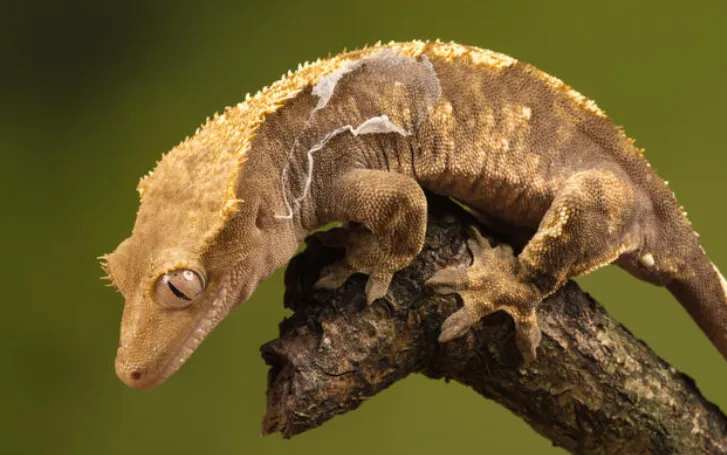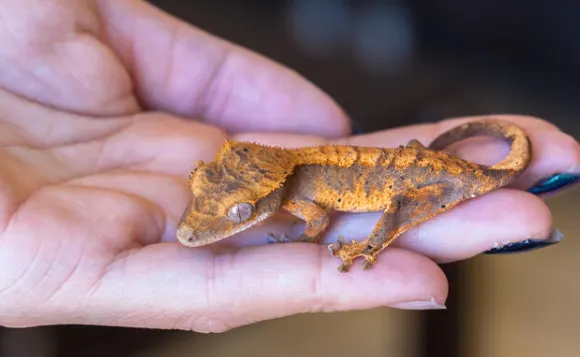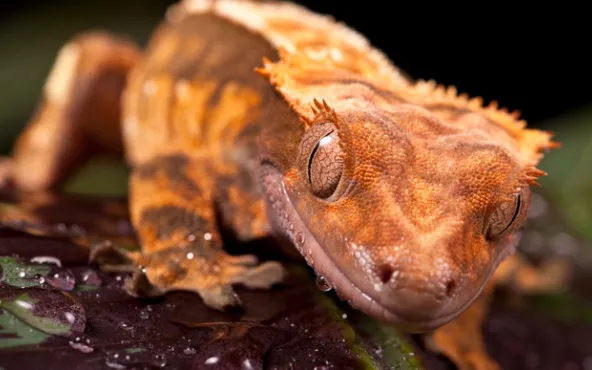
Table of Contents
Diet
Q: What do crested geckos eat in the wild?
A: In the wild, crested geckos primarily consume a diet of insects and fruits. They’re opportunistic feeders, taking advantage of available
Q: What can I feed my crested gecko?
A: In captivity, crested geckos can be fed a combination of commercial crested gecko diet, insects (like crickets and roaches), and occasional fruit purees.
Q: How often should I feed my crested gecko?
A: Juvenile crested geckos should be fed daily, while adults can be fed every other day or three times a week.
Q: Can crested geckos eat fruit?
A: Yes, crested geckos can eat fruit, but it should be given as an occasional treat and not a primary
Q: What fruits can crested gecko eat?
A: Crested geckos can eat a variety of fruits. However, it’s essential to ensure they are provided in the correct manner, and some fruits should only be given occasionally. Here’s a list of fruits that are safe for crested geckos:
- Mango: This is a favorite among many crested geckos and can be a staple fruit for them.
- Papaya: Another favorite and can also be a staple.
- Fig: High in calcium, this is a great choice for crested geckos.
- Bananas: While crested geckos often like bananas, they should be given in moderation due to their high phosphorus content.
- Berries: This includes blueberries, raspberries, and strawberries. They can be given occasionally.
- Apples: Ensure they are peeled and given in moderation.
- Pears: These should also be peeled and can be given occasionally.
- Kiwi: Can be offered occasionally.
- Watermelon: Due to its high water content, it should only be an occasional treat.
- Peaches and Plums: Make sure they are pitted and given in moderation.
Q: Which commercial diets are best for crested geckos?
A: There are several reputable commercial diets available, such as Repashy and Pangea. It’s essential to choose one that is well-balanced and specifically designed for crested geckos.
Q: Do crested geckos need live insects in their diet?
A: While commercial diets are nutritionally complete, offering live insects like crickets, dubia roaches, or waxworms can provide enrichment and additional protein. It’s recommended to feed insects once or twice a week.
Q: How much
A: The amount varies based on the gecko’s age and size. Typically, a crested gecko should eat as much as it can within 15-20 minutes.
Q: Can crested geckos eat vegetables?
A: Vegetables are not a natural part of their diet, and there’s little evidence to suggest they benefit from them. It’s best to stick to commercial diets, insects, and fruits.
Q: What insects are safe for crested geckos?
A: Safe insects include crickets, dubia roaches, mealworms, and waxworms. Always ensure the insects are appropriately sized for the gecko.
Q: Do I need to supplement my crested gecko’s diet with vitamins and minerals?
A: If you’re using a high-quality commercial diet, additional supplementation is typically unnecessary. However, if you’re feeding a significant amount of insects, calcium and vitamin D3 supplements might be needed.
Q: How to prepare and serve fruits to a crested gecko?
A: Fruits should be washed, peeled (if necessary), and mashed or pureed before serving. Remove any seeds and serve in a shallow dish.
Q: Can crested geckos eat baby
A: While some keepers use baby
Q: Is it necessary to dust insects with calcium before feeding them to crested geckos?
A: If you’re feeding insects regularly, it’s a good practice to dust them with calcium powder to ensure your gecko is getting enough calcium.
Q: Why is my crested gecko not eating?
A: There could be several reasons, including stress, illness, improper temperatures, or shedding. If the lack of appetite persists, it’s best to consult a veterinarian.
Q: Can I feed my crested gecko pinky mice?
A: It’s not common or necessary to feed pinky mice to crested geckos. Stick to their primary diet of commercial
Q: How do I provide water for my crested gecko?
A: Provide a shallow dish of fresh water. Additionally, misting the enclosure daily helps with hydration as they often drink water droplets from the enclosure walls and decor.
Q: Are there foods that are toxic to crested geckos?
A: Foods like avocado, chocolate, and certain artificial sweeteners are toxic. Always research before introducing any new
Q: How can I ensure the insects I feed my gecko are nutritious?
A: Gut-loading, or feeding nutritious foods to the insects 24 hours before offering them to your gecko, ensures they’re packed with nutrients. Foods for gut-loading include leafy greens, carrots, and commercial insect diets.
Q: Can crested geckos eat mealworms?
A: Yes, crested geckos can eat mealworms, but they should be offered in moderation and as part of a varied diet.

Habitat
Q: What type of enclosure is best for crested geckos?
A: Crested geckos thrive in vertically oriented enclosures due to their arboreal nature. Glass terrariums with a mesh top are ideal as they provide good visibility, maintain humidity, and offer proper ventilation.
Q: How big should a crested gecko’s terrarium be?
A: For an adult crested gecko, a terrarium size of 20 gallons or larger is recommended, with dimensions ideally being taller than they are wide, given their preference for climbing.
Q: What is the ideal humidity level for crested geckos?
A: Crested geckos require a humidity level of around 60-80%. It’s important to have a humidity gradient, with higher humidity at night and slightly lower during the day.
Q: What kind of substrate is best for crested geckos?
A: Coconut fiber, orchid bark, and sphagnum moss are all suitable substrates for crested geckos. They help retain moisture and mimic their natural environment. Avoid sand or other loose substrates as they can cause impaction.
Q: Do crested geckos need UVB lighting?
A: While crested geckos can survive without UVB lighting, providing low levels of UVB can be beneficial for their overall health and bone development.
Q: How do I maintain the temperature in a crested gecko’s habitat?
A: The ideal temperature for crested geckos is around 72°F to 78°F during the day and can drop slightly at night. A heat mat or low-wattage basking light can help achieve this. Always use a thermostat and monitor with thermometers.
Q: How often should I mist my crested gecko’s enclosure?
A: Mist the enclosure once or twice daily, aiming for higher humidity at night. This helps replicate their natural environment and aids in hydration.
Q: What plants are safe for crested gecko habitats?
A: Both live and artificial plants are safe. Live plants like Pothos, Snake plants, or Bromeliads are ideal as they also aid in maintaining humidity.
Q: Can crested geckos be housed together?
A: While juvenile geckos can be temporarily housed together, adult males can be territorial and should not be housed together. One male and multiple females or just females can cohabitate but always monitor for signs of stress or aggression.
Q: How often should I clean my crested gecko’s terrarium?
A: Spot clean daily to remove feces and uneaten
Q: Do crested geckos need a heat source?
A: Crested geckos do best at room temperature and generally don’t require an additional heat source unless the room temperature falls below 65°F.
Q: What type of hides or decorations are best for crested geckos?
A: Cork bark, wooden branches, and foliage (both real and fake) are ideal. Crested geckos appreciate multiple hiding spots and climbing structures.
Q: How to set up a bioactive terrarium for crested geckos?
A: A bioactive terrarium includes live plants, a drainage layer, beneficial microorganisms, and a cleanup crew (like isopods). This setup mimics a natural environment and can be self-cleaning, but it requires a good understanding of maintaining balance within the terrarium.
Q: How can I monitor and control the humidity in my crested gecko’s habitat?
A: Using a hygrometer helps monitor humidity levels. Regular misting, live plants, and a substrate that retains moisture can help maintain the desired humidity.
Q: Are live plants or artificial plants better for crested gecko terrariums?
A: Both have their pros and cons. Live plants help with humidity and provide a natural environment but require care themselves. Artificial plants are low maintenance and last longer. A combination of both often works well.

Behavior
Q: Why is my crested gecko jumping?
A: Crested geckos are arboreal creatures, meaning they naturally live in trees. Jumping is a natural behavior for them, helping them move between branches in the wild. In captivity, they might jump from one decor to another or even from your hand.
Q: Do crested geckos like to be handled?
A: Every crested gecko has its own personality. While some may tolerate handling quite well, others might be more skittish. It’s essential to handle them gently and gradually to avoid causing them stress.
Q: Why is my crested gecko chirping?
A: Crested geckos can make chirping sounds for various reasons, including feeling threatened, trying to communicate with other geckos, or even during breeding sessions.
Q: How do crested geckos communicate?
A: They communicate through body language, tail waving, chirping, and licking. Observing your gecko can help you understand its needs and feelings.
Q: Is it normal for crested geckos to drop their tail?
A: Yes, it’s a defense mechanism called “caudal autotomy.” Unlike some other reptiles, crested geckos won’t regrow their tails once dropped.
Q: Why does my crested gecko hide all day?
A: Crested geckos are nocturnal, so it’s natural for them to hide during the day and become more active during the night.
Q: How active should a crested gecko be?
A: They are most active during the night, climbing, exploring, and hunting for
Q: Are crested geckos nocturnal?
A: Yes, they are primarily active during the night.
Q: Why is my crested gecko licking its eyes?
A: Crested geckos don’t have eyelids, so they lick their eyes to keep them moist and clean.
Q: Do crested geckos recognize their owners?
A: While they might not recognize owners in the same way mammals do, with consistent handling and interaction, they can become accustomed to their keeper’s presence.
Q: How can I tell if my crested gecko is stressed?
A: Signs of stress can include excessive hiding, refusal to eat, rapid breathing, or frequent tail waving.
Q: Why is my crested gecko not eating?
A: There can be several reasons, including stress, illness, shedding, or unsuitable habitat conditions. It’s crucial to ensure the right environment and consult a vet if the behavior persists.
Q: Do crested geckos need company or prefer solitude?
A: They are solitary animals and often do best when housed alone. Keeping them with others can lead to stress or even aggression.
Q: Why is my crested gecko shaking its tail?
A: This is typically a defensive behavior, signaling that the gecko feels threatened.
Q: Can crested geckos be aggressive?
A: Generally, they are calm, but they can show signs of aggression if they feel threatened or during breeding.
Q: How do crested geckos show affection?
A: They might not show “affection” in a way humans understand, but a calm and relaxed gecko that doesn’t mind handling might indicate trust.
Q: Why is my crested gecko digging?
A: Female geckos might dig if they are gravid (carrying eggs). Otherwise, digging can also be a sign of exploration or trying to find a comfortable spot.
Q: Do crested geckos like to climb?
A: Yes, being arboreal, they love to climb and should have vertical space and climbing structures in their enclosure.
Q: Why is my crested gecko not sticking to surfaces?
A: This could be due to shedding, an unhealthy diet, or an underlying health issue. It’s good to consult with a vet if you’re concerned.
Q: How often do crested geckos shed?
A: Juvenile geckos shed more frequently, often every week or two, while adults may shed every few weeks to a month. The frequency can vary based on growth rate and environmental conditions.

Health and Wellness
Q: What are the symptoms of a sick crested gecko?
A: Symptoms of a sick crested gecko may include lethargy, lack of appetite, irregular shedding, weight loss, labored breathing, discolored or swollen body parts, and abnormal feces. Regular monitoring and comparison to their usual behavior can help in early detection.
Q: How can I tell if my crested gecko is dehydrated?
A: Signs of dehydration in crested geckos include wrinkled or loose skin, sunken eyes, and decreased activity. You can also gently pinch their skin; if it doesn’t snap back quickly, they might be dehydrated.
Q: Why isn’t my crested gecko eating?
A: Many factors can affect a gecko’s appetite, including stress, changes in environment, illness, shedding, or even breeding season. Ensure they have the right habitat conditions and offer a varied diet. If the lack of appetite persists, consult a vet.
Q: Is it normal for crested geckos to lose their tails?
A: While it’s not ideal, crested geckos can drop their tails as a defense mechanism, and unlike other geckos, they won’t regrow it. It’s essential to keep the area clean to prevent infection.
Q: How do I treat a crested gecko with metabolic bone disease?
A: Metabolic bone disease results from a calcium deficiency or improper UVB lighting. It’s crucial to get a proper calcium and vitamin D3 supplement and provide adequate UVB lighting. Always consult a vet for a proper diagnosis and treatment.
Q: What should I do if my crested gecko has a shedding problem?
A: Ensure the habitat has proper humidity. You can also provide a moist hide and gently mist the gecko. If shedding problems persist, seek advice from a vet, as it may indicate underlying health issues.
Q: Can crested geckos get parasites, and how are they treated?
A: Yes, crested geckos can get internal and external parasites. Treatments vary based on the specific parasite, so it’s vital to consult a reptile vet for diagnosis and appropriate treatment.
Q: What are common skin issues in crested geckos?
A: Common skin issues include fungal infections, burns, wounds, or irregular shedding. Each requires different treatments, so consult with a vet for proper care.
Q: How often should a crested gecko poop, and what should it look like?
A: Depending on their diet and age, a healthy crested gecko may poop every day or every few days. Feces should be firm, dark in color with a white, chalky urate section.
Q: Why is my crested gecko lethargic?
A: Lethargy can be due to various factors like low temperatures, illness, stress, or dehydration. Ensure the habitat is optimal and consult a vet if the behavior continues.
Q: How do I treat a crested gecko with a respiratory infection?
A: Respiratory infections are serious and often require antibiotic treatments prescribed by a vet. Ensure the habitat is clean, and the temperatures are optimal.
Q: Can crested geckos get mites, and how do I treat them?
A: Yes, they can get mites. Treatment usually involves cleaning the habitat thoroughly and using specific mite treatments, but always consult a vet first.
Q: How can I prevent fungal infections in crested geckos?
A: Ensure the habitat is clean and not overly damp. Proper ventilation and regular habitat cleaning can reduce the risk of fungal infections.
Q: Is it normal for a crested gecko to sleep during the day?
A: Yes, crested geckos are primarily nocturnal, so they typically sleep during the day and are active at night.
Q: How often should I bring my crested gecko to a vet?
A: At least once a year for a general check-up, or whenever you notice any signs of illness or abnormal behavior.
Q: What kind of supplements do crested geckos need?
A: Crested geckos need calcium and vitamin D3 supplements to maintain bone health. Ensure they’re given as per recommendations.
Q: Why is my crested gecko’s mouth black or discolored?
A: Discoloration can be a sign of mouth rot or other infections. It’s crucial to get it checked by a vet.
Q: Can crested geckos overeat or become overweight?
A: Yes, like all pets, they can overeat if given too much
Q: How do I know if my crested gecko has an impaction?
A: Signs of impaction include lack of appetite, lack of defecation, or a swollen abdomen. Consult a vet immediately.
Q: What are signs of stress in crested geckos, and how can I alleviate it?
A: Signs of stress include excessive hiding, not eating, or aggressive behavior. Ensure the habitat is optimal, reduce handling, and consult a vet if needed.
- Enchi Ball Python: A Unique and Stunning Morph of Python regius - March 27, 2025
- Emerald Tree Monitor: The Enigmatic Green Guardian of the Rainforest - March 26, 2025
- The Egyptian Cobra (Naja haje): A Fascinating Serpent - March 25, 2025
